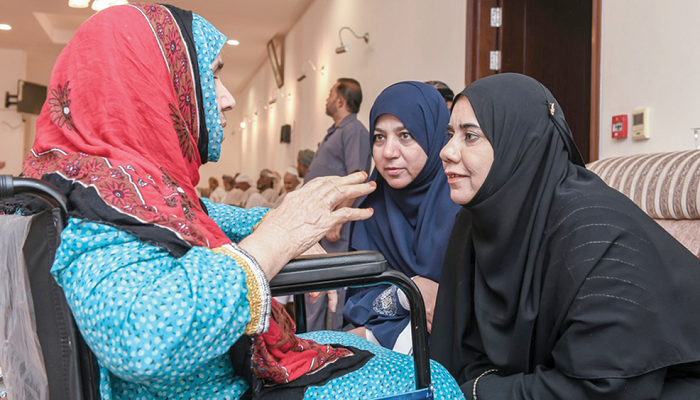

Muscat: The Council of Ministers’ referral of the draft law on social protection to the Council of Oman reflects the Royal attention accorded by His Majesty Sultan Haitham bin Tarik to the welfare of Omani people in accordance with the Basic Law of the State and Oman Vision 2040.
The social protection draft law establishes a system that covers instruments and programmes benefiting all segments of society and proposes extending social protection and retirement benefits to citizens and residents in the Sultanate of Oman.
The social protection system provides for designing an integrated system by introducing monetary social benefit programmes and social insurance programmes, as well as the development of comprehensive basic social protection programmes that target different segments and life-cycle stages.
These provide a minimum level of social protection for individuals and society, besides developing the current social insurance programmes based on subscriptions, enhancing their financial sustainability and expanding them to cover all segments of the labour market.
The programmes will cover various risks to which an insured person might be exposed, notably the risks of decreased ability to earn due to old age, disability, work-related injuries, occupational diseases, sick leaves and other cases.
Also envisaged is the establishment of a central management and a unified community database for providing cash assistance programmes and social insurance programmes, making them easily accessible to target groups, with clear-cut and unified terms entitlement.
This is in addition to ensuring that the social protection system is capable of accommodating economic and social variables.
The new social protection system’s programmes were designed according with the principles guiding the state’s policy stipulated in the Basic Law of the State and national and other priorities included in Oman Vision 2040.
This provides for devising retirement systems and social security programmes in line with economic and social developments and international practices on the application of social insurance programmes, social protection benefits and the ability of funding parties to contribute to the Social Protection System in a manner that realizes optimal distribution of available financial resources.
The draft law includes the endorsement of several monetary benefits extended within social protection programmes where "the entitlement of most cases does not necessarily depend on social research". The benefits also cover social insurance programmes and savings programmes. The benefits are stated as follows:
- The “Assistance to the Elderly Benefit”, which is a monthly cash payment for every Omani citizen. It seeks to compensate for a decline in an elderly person’s ability to earn a living.
- The “Childhood Benefit”, which is a monthly cash benefit for each child and targets risks that some face during the childhood stage.
- The "Persons with Disability Benefit", which is a monthly cash payment disbursed to persons with disability whose condition requires care and support, including disabilities incurred from birth or due to an incident or a symptom developed at a later stage.
- The “Orphans and Widows’ Benefit”, which is a monthly cash payment. It targets orphans and widows who are not covered by the social insurance systems or who receive pension shares less than the level of entitlement specified in this new system of benefits.
- The “Family Income Support Benefit”, which is a monthly assistance that depends on social research and is intended to support families with the least chances for having sufficient earning. This depends on the number of family members and total income.
* Old Age, Inability to Earn and Death Programme:
This programme deals with risks posed to the elderly, inability to earn and death (within the context of the unified retirement system).
It is a basic, unified retirement programme that covers all sectors in the labour market, whether government or private. It has been designed in a manner that provides suitable insurance coverage for various groups, jobs and occupations in the labour market.
The programme grants the right for voluntary retirement to the group of employees who completed 20 years of actual service and fulfil the conditions for retirement in the current regulations by the date of the law comes into force.
The target employees can avail this right without committing themselves to the years of service required in the new law. The value of their retirement pension is secured on the date this law comes into force.
* Social Insurance Programme for Work-related Injuries and Occupational Diseases:
This is an insurance programme that covers the insured during a work-related injury. It provides a cash allowance in the case of injury, as well as cash compensations in case of inability to work, in accordance with the percentage of disability resulting from the injury or occupational disease. It also stipulates a retirement pension in cases of total disability or death due to work-related injuries or occupational diseases.
* Social Insurance Programme for Job Security Risks:
This is an insurance programme that covers the insured in cases of termination of service for reasons beyond the insured's control. It replaces the job security system. It has been designed to deal with some of the challenges facing the current job security system.
* Social Insurance Programme for Maternity Leave:
This is a new insurance programme dealing with maternity leave and it is introduced in consideration for the period of childbirth. It is aimed at covering the income of working women during the period of childbirth under a collaborative social insurance system to enhance social protection for the family.
* Social Insurance Programme for Sick Leaves and Non-scheduled Leaves:
This programme, which deals with sick leaves and unscheduled leaves, is an insurance programme that modifies job entitlement from sick leaves and unusual or unscheduled leaves. It entitles the beneficiaries/the insured to avail an insurance protection and transfer the cost from the employer to the social protection system.
* Savings Programme:
This is an optional programme for Omanis designed to achieve several objectives, including the possibility of planning additional benefits upon retirement or scheduling benefits for several years prior to the retirement age specified in the law or determining retirement benefits in excess of the wage subject to the prescribed subscription ratio of insurance for the elderly.
It should be noted that the proposed Social Protection Law was drafted in several stages and that the opinion of a number of specialists, stakeholders, and international houses of expertise was sought when compiling the draft law. It was designed to keep pace with best practices and international standards.